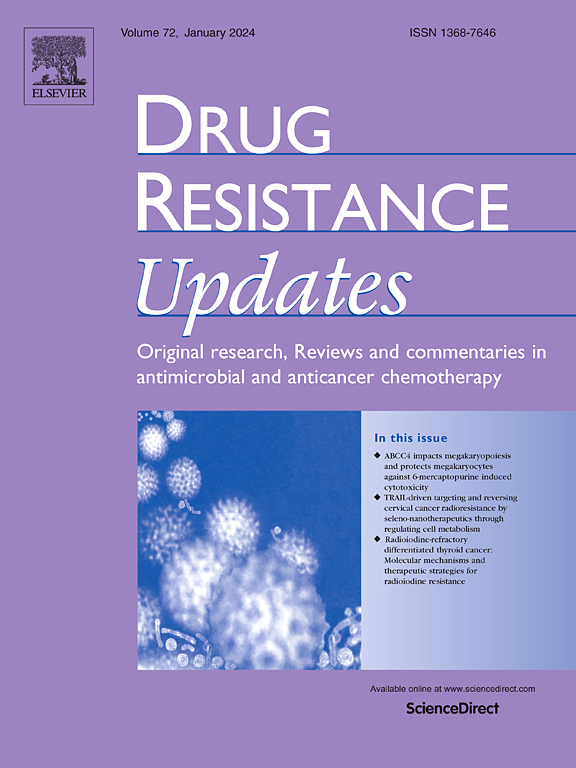阻断嘌呤代谢可逆转巨噬细胞免疫抑制,增强非小细胞肺癌的抗肿瘤免疫力
IF 21.7
1区 医学
Q1 PHARMACOLOGY & PHARMACY
引用次数: 0
摘要
目的 由于肿瘤微环境具有免疫抑制作用,免疫检查点阻断疗法对大多数非小细胞肺癌(NSCLC)患者无效。巨噬细胞是肿瘤浸润免疫细胞的关键组成部分,在免疫抑制中发挥着关键作用,而免疫抑制可由细胞内在代谢介导。本研究旨在评估巨噬细胞是否通过与癌细胞的代谢串扰调控NSCLC的进展并影响免疫疗法的疗效。方法通过单细胞测序分析NSCLC组织的巨噬细胞情况,并通过流式细胞术和免疫荧光进行验证。采用多重检测、单细胞测序数据、ELISA、免疫荧光和RNA-seq等方法研究和验证巨噬细胞介导的代谢调控对免疫抑制的作用机制。结果我们发现,肿瘤组织来源的巨噬细胞表现出抗炎表型,对 NSCLC 有预后价值。NSCLC 细胞分泌的 CXCL8 将巨噬细胞从肿瘤周围组织招募到肿瘤部位,并通过激活嘌呤代谢,增加黄嘌呤脱氢酶和尿酸的产生,促进程序性死亡配体 1(PD-L1)的表达。此外,嘌呤代谢介导的巨噬细胞免疫抑制依赖于NLRP3/caspase-1/IL-1β信号传导。总之,我们的研究结果揭示了嘌呤代谢在巨噬细胞免疫抑制中的关键作用,并表明阻断嘌呤代谢与免疫检查点阻断相结合可在NSCLC治疗中产生协同效应。本文章由计算机程序翻译,如有差异,请以英文原文为准。
Blockade of purine metabolism reverses macrophage immunosuppression and enhances anti-tumor immunity in non-small cell lung cancer
Aims
Immune checkpoint blockade therapy is not effective in most patients with non-small cell lung cancer (NSCLC) due to the immunosuppressive tumor microenvironment. Macrophages are key components of tumor-infiltrating immune cells and play a critical role in immunosuppression, which can be mediated by cell-intrinsic metabolism. This study aimed to evaluate whether macrophages regulate NSCLC progression through metabolic crosstalk with cancer cells and affect immunotherapy efficacy.
Methods
The macrophage landscape of NSCLC tissues were analyzed by single-cell sequencing and verified through flow cytometry and immunofluorescence. Multiplex assay, single-cell sequencing data, ELISA, immunofluorescence, and RNA-seq et al. were used to investigate and verify the mechanism of macrophage-mediated metabolic regulation on immunosuppression. The tumor-bearing model was established in C57BL/6 J mice to explore in vivo efficacy.
Results
We found that tumor tissue-derived macrophages exhibited an anti-inflammatory phenotype and had a prognostic value for NSCLC. NSCLC cell-secreted CXCL8 recruited macrophages from peritumor tissues to tumor sites and promoted programmed death-ligand 1 (PD-L1) expression by activating purine metabolism with increasing xanthine dehydrogenase and uric acid production. Moreover, purine metabolism-mediated macrophage immunosuppression was dependent on NLRP3/caspase-1/IL-1β signaling. Blockade of purine metabolism signaling enhanced anti-tumor immunity and the efficacy of anti-PD-L1 therapy.
Conclusions
Collectively, our findings reveal a key role of purine metabolism in macrophage immunosuppression and suggest that blockade of purine metabolism combined with immune checkpoint blockade could provide synergistic effects in NSCLC treatment.
求助全文
通过发布文献求助,成功后即可免费获取论文全文。
去求助
来源期刊

Drug Resistance Updates
医学-药学
CiteScore
26.20
自引率
11.90%
发文量
32
审稿时长
29 days
期刊介绍:
Drug Resistance Updates serves as a platform for publishing original research, commentary, and expert reviews on significant advancements in drug resistance related to infectious diseases and cancer. It encompasses diverse disciplines such as molecular biology, biochemistry, cell biology, pharmacology, microbiology, preclinical therapeutics, oncology, and clinical medicine. The journal addresses both basic research and clinical aspects of drug resistance, providing insights into novel drugs and strategies to overcome resistance. Original research articles are welcomed, and review articles are authored by leaders in the field by invitation.
Articles are written by leaders in the field, in response to an invitation from the Editors, and are peer-reviewed prior to publication. Articles are clear, readable, and up-to-date, suitable for a multidisciplinary readership and include schematic diagrams and other illustrations conveying the major points of the article. The goal is to highlight recent areas of growth and put them in perspective.
*Expert reviews in clinical and basic drug resistance research in oncology and infectious disease
*Describes emerging technologies and therapies, particularly those that overcome drug resistance
*Emphasises common themes in microbial and cancer research
 求助内容:
求助内容: 应助结果提醒方式:
应助结果提醒方式:


